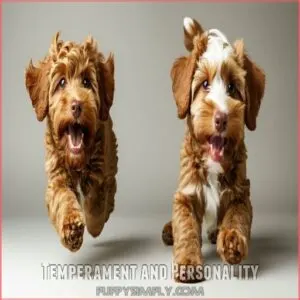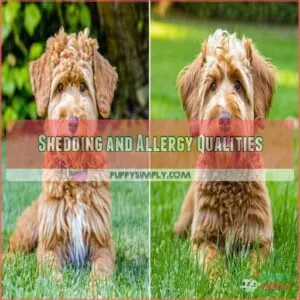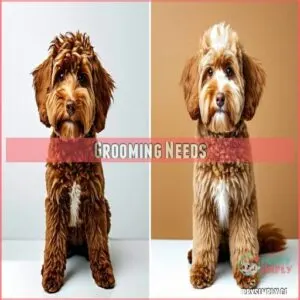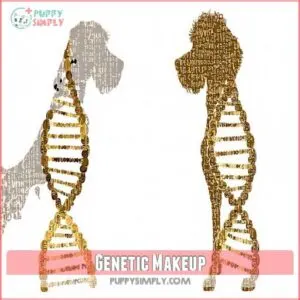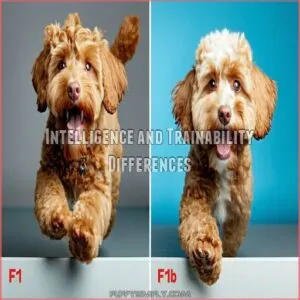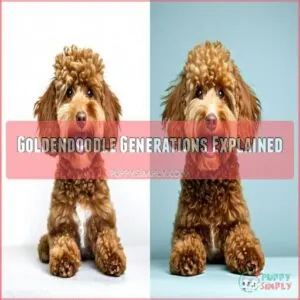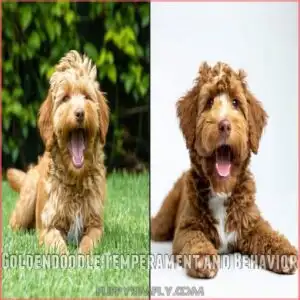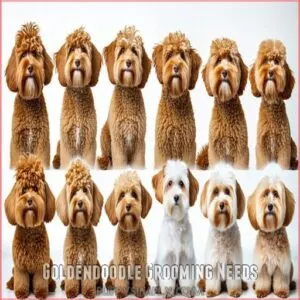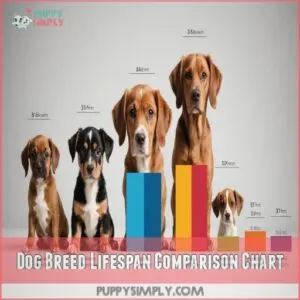This site is supported by our readers. We may earn a commission, at no cost to you, if you purchase through links.
 When choosing between an f1 vs f1b goldendoodle, you’ll notice some key differences.
When choosing between an f1 vs f1b goldendoodle, you’ll notice some key differences.
F1s are a 50-50 mix of Golden Retriever and Poodle, with moderate shedding and a wavy coat that’s easier to maintain. They’ll need brushing 2-3 times weekly.
F1Bs are 75% Poodle, making them more hypoallergenic with curlier coats that require daily grooming.
Both types share similar sizes (15-22 inches) and friendly personalities, though F1Bs tend to be slightly more reserved.
Your budget matters too – F1s typically cost $1,000-$3,000, while F1Bs run $2,000-$5,000. The right choice often comes down to your lifestyle and grooming commitment.
Table Of Contents
- Key Takeaways
- What is an F1 Goldendoodle?
- What is an F1B Goldendoodle?
- F1 Vs F1B Goldendoodle Comparison
- Goldendoodle Generations Explained
- Choosing The Right Goldendoodle Generation
- F1 Goldendoodle Vs F1B Goldendoodle: Which is Better?
- Goldendoodle Temperament and Behavior
- Goldendoodle Grooming Needs
- Goldendoodle Health Considerations
- Cost Considerations for F1 and F1B Goldendoodles
- Frequently Asked Questions (FAQs)
- What is the difference between F1 and F1B Goldendoodles?
- Are F1 or F1B better?
- Is F1 or F1B more expensive?
- Are F1 or F2 Goldendoodles better?
- What is the difference between F1 & F1 Goldendoodle?
- What is a F1B goldendoodle?
- Are F1 Goldendoodles better than F1B?
- What is the difference between F1 and F1B coats?
- Which generation Goldendoodle is best?
- What are the exercise needs of Goldendoodles?
- Conclusion
Key Takeaways
- You’ll find F1 Goldendoodles have a 50-50 Golden Retriever-Poodle mix, with moderate shedding and wavy coats, while F1Bs are 75% Poodle, with curlier, more hypoallergenic coats.
- You’ll need to commit to more grooming with an F1B, requiring daily brushing and professional grooming every 4–6 weeks, compared to F1s needing only 2–3 weekly brushings.
- You’ll spend more on an F1B ($2,000–$5,000) than an F1 ($1,000–$3,000), but both share similar size ranges (15–22 inches) and lifespans (10–15 years).
- You’ll notice F1s have more balanced traits and higher hybrid vigor, while F1Bs show more Poodle-like characteristics, with slightly more reserved personalities.
What is an F1 Goldendoodle?
You’ll find that an F1 Goldendoodle is a first-generation crossbreed that’s exactly 50% Golden Retriever and 50% Poodle, resulting from breeding a purebred Golden Retriever with a purebred Poodle.
These lovable hybrids typically inherit a mix of their parents’ best traits, showing the intelligence of a Poodle combined with the friendly nature of a Golden Retriever.
Their coat type and shedding patterns can vary.
Physical Characteristics
The allure of an F1 Goldendoodle lies in its distinctive physical features.
You’ll find these pups come in a delightful range of sizes from 15 to 22 inches tall, weighing between 15 and 60 pounds.
Here’s what makes them stand out:
- A wavy, low-maintenance coat in various colors
- Well-proportioned, athletic build
- Expressive, almond-shaped eyes
- Floppy ears that frame their face perfectly
Their size variations make them adaptable to different living spaces.
Temperament and Personality
Moving beyond looks, your F1 Goldendoodle‘s personality will light up your life. These pups blend the best traits of both parent breeds, creating a unique companion who’s smart as a whip and loving to boot.
| Trait | Description | Rating |
|---|---|---|
| Intelligence | Quick learner, problem solver | High |
| Sociability | Loves people and other pets | Excellent |
| Energy Level | Playful but can chill | Moderate |
You’ll find these social butterflies excel at training and adapt beautifully to family life, making them perfect partners for active households.
Shedding and Allergy Qualities
While your F1 Goldendoodle’s loving personality brings joy, let’s talk about what’s on everyone’s mind: shedding.
F1 Goldendoodles shed moderately, inheriting a mix of Golden Retriever and Poodle coat traits.
Don’t count on a completely hypoallergenic pup – that’s actually a common myth. You’ll notice some seasonal shedding, particularly during spring and fall.
But here’s good news: they typically shed less than pure Golden Retrievers.
Grooming Needs
Regular grooming keeps your F1 Goldendoodle’s wavy coat looking its best. Just like maintaining a garden, you’ll need a consistent routine to prevent matting and tangles.
Here’s what you’ll need for effective grooming:
- A slicker brush for daily detangling
- Metal comb for removing loose undercoat
- Professional grooming every 6-8 weeks
- High-quality dog shampoo for monthly baths
Keep brushing sessions short and positive to build a lasting grooming bond.
Health Considerations
Beyond grooming, your F1 Goldendoodle’s health deserves careful attention.
These pups benefit from hybrid vigor, which can mean fewer inherited health issues than their purebred parents.
However, they’re still prone to certain conditions like hip dysplasia and eye problems. Working with reputable breeders who perform genetic testing is your best defense.
Regular vet check-ups and a balanced diet help keep your furry friend thriving.
Price Range
Investing in a furry friend comes with price considerations that vary based on several factors. F1 Goldendoodles typically cost between $1,000 and $3,000, making them a more budget-friendly option compared to other generations.
Here’s what influences an F1 Goldendoodle’s price tag:
- Breeder reputation and experience
- Geographic location (urban areas often command higher prices)
- Coat color and markings
- Health testing and certifications
- Size category (standard, medium, or mini)
What is an F1B Goldendoodle?
You’ll find that an F1B Goldendoodle is a specially bred dog that’s 75% Poodle and 25% Golden Retriever, created by breeding an F1 Goldendoodle with a purebred Poodle.
These dogs are particularly popular among allergy sufferers because they’re more likely to have a non-shedding coat than their F1 counterparts.
Physical Features
Looking at an F1B Goldendoodle, you’ll notice distinct physical features inherited from its 75% Poodle genetics.
These pups typically stand 15-22 inches tall and weigh between 15-60 pounds.
Their coat tends to be curlier than F1s, usually wavy or tightly curled, and comes in various colors.
You’ll spot slightly longer ears, a refined muzzle, and alert, almond-shaped eyes characteristic of their Poodle ancestry.
Behavioral Traits
F1B Goldendoodles shine in the personality department, inheriting the Poodle’s sharp intelligence and the Golden Retriever’s friendly nature.
You’ll find these pups are more reserved than their F1 cousins, but they’re still social butterflies at heart.
Thanks to that extra dose of Poodle genes, they’re quick learners and keen to please, making training sessions a breeze.
They fit perfectly into most family dynamics and get along wonderfully with other pets.
Grooming Requirements
You’ll need to step up your grooming game with an F1B Goldendoodle‘s curlier, more Poodle-like coat. Their unique fur texture demands regular maintenance to prevent matting and tangles.
When choosing a haircut, consider options like the Teddy Bear Goldendoodle haircuts, which accentuates facial features but requires high maintenance.
Here’s what you’ll need to tackle:
- Daily brushing with a slicker brush and metal comb
- Professional grooming every 6-8 weeks
- Regular ear cleaning to prevent moisture buildup
- Bath time every 4-6 weeks using quality dog shampoo
Health Profile
Beyond their curly coats and grooming needs, F1B Goldendoodles inherit specific health traits from their Poodle-dominant genetics.
For their best health, consider investing in F1B Goldendoodle health products.
Like their F1 cousins, they typically enjoy robust hybrid vigor but can face hip dysplasia, ear infections, and eye problems.
Regular vet check-ups, genetic testing, and a balanced diet help guarantee your furry friend stays healthy throughout their 10-15 year lifespan.
Daily exercise keeps their joints strong and their spirits high.
F1 Vs F1B Goldendoodle Comparison
You’ll notice key differences between F1 and F1B Goldendoodles in their genetics, coat types, and temperaments.
F1B dogs have more Poodle traits due to their 75% Poodle heritage.
While F1 Goldendoodles offer greater hybrid vigor and a more balanced mix of parent breeds, F1B puppies typically shed less and are more likely to be hypoallergenic, though they’ll need more frequent grooming.
Genetic Makeup
Diving into the DNA differences, F1 Goldendoodles are a direct 50-50 split between Golden Retriever and Poodle parents.
Meanwhile, F1B Goldendoodles result from breeding an F1 Goldendoodle with a Poodle, creating a 75% Poodle and 25% Golden Retriever mix.
This genetic makeup influences everything from their appearance to their temperament, though individual puppies can still inherit traits unpredictably from either parent breed.
Shedding and Allergy-Friendly Qualities
Speaking of genetics, let’s talk about what matters most to allergy sufferers. F1B Goldendoodles typically shed less than their F1 cousins, thanks to their 75% Poodle genes. While no dog is completely hypoallergenic, here’s what you can expect:
- F1s have a 50% chance of inheriting a non-shedding coat, with moderate seasonal shedding
- F1Bs boast a 75% chance of minimal shedding, making them more allergy-friendly
- Both types need regular brushing to manage loose fur and dander
Intelligence and Trainability Differences
Both F1 and F1B Goldendoodles inherit remarkable intelligence from their parent breeds, making them quick learners, similar to other breeds like intelligent dog breeds easy to train.
Here’s how they stack up in training:
| Trait | F1 Goldendoodle | F1B Goldendoodle |
|---|---|---|
| Training ease | Highly trainable | Extremely trainable |
| Learning speed | Quick to learn | Lightning-fast |
| Problem-solving | Strong skills | Exceptional skills |
| Obedience levels | Very good | Excellent |
You’ll notice F1Bs often show slightly higher trainability due to their increased Poodle genetics, though both make brilliant companions.
Size and Weight Variations
F1 and F1B Goldendoodles share similar size and weight ranges, typically standing 15-22 inches tall and weighing between 15-60 pounds.
For more specific information on F1 Goldendoodle size, you can check out products made for their needs here for F1 goldendoodle size.
Here’s what you’ll find with each type:
- F1 Goldendoodles tend to have more size variety due to their direct 50/50 mix
- F1B sizes are slightly more predictable thanks to higher Poodle genetics
- Both types come in standard, medium, and miniature variations depending on the Poodle parent
Lifespan and Health Expectations
Moving beyond physical measurements, let’s look at what keeps your furry friend healthy and happy for years to come.
While F1 and F1b Goldendoodles share a similar lifespan of 10-15 years, their health profiles show some interesting differences.
| Health Aspect | F1 Goldendoodle | F1B Goldendoodle |
|---|---|---|
| Hybrid Vigor | Higher | Moderate |
| Common Issues | Hip dysplasia, eye problems | Skin conditions, ear infections |
| Genetic Testing | Recommended | Highly recommended |
| Health Screening | Basic panel | Advanced panel |
Goldendoodle Generations Explained
You’ll discover that Goldendoodle generations aren’t just random letters and numbers – they’re actually a precise code that tells you exactly what you’re getting in your future furry friend.
Understanding these generation codes will help you pick the perfect pup for your family’s needs and lifestyle.
When you’re choosing between an F1 or F1B Goldendoodle, understanding these generation codes will help you pick the perfect pup for your family’s needs and lifestyle.
What Does The “F” Mean?
The "F" in Goldendoodle generations stands for "Filial hybrid," a genetic term describing offspring from two different purebred parents.
Think of it as a family tree marker that helps track the genetic journey of these designer dogs.
Understanding this F-generation meaning is important because it indicates the potential for hybrid vigor – the tendency of mixed-breed dogs to inherit the best traits from both parent breeds.
What Does The Number Mean?
Numbers in Goldendoodle generations tell you how far removed your pup is from the original purebred parents.
First-generation (F1) comes directly from breeding a Golden Retriever with a Poodle, creating that perfect 50-50 split.
Second-generation (F2) puppies come from two F1 Goldendoodles, while third-generation (F3) comes from two F2s.
Each generation brings its own unique blend of traits.
What Does The “B” Mean?
In the fascinating world of Goldendoodle genetics, "B" stands for backcrossing – breeding a first-generation Goldendoodle back to a purebred Poodle.
You’ll find this creates an F1B puppy with 75% Poodle and 25% Golden Retriever genes.
Think of it like adding an extra dash of Poodle to the mix, which typically results in a curlier coat type and more predictable traits than their F1 counterparts.
Importance of Generation for Allergy Sufferers
Understanding generations becomes a game-changer if you’re dealing with allergies.
F1B Goldendoodles, with their 75% Poodle genes, typically offer better allergy-friendly qualities than F1s.
F1BBs and F2BBs provide your best shot at minimizing reactions.
Remember, individual dogs within each generation can vary, so spending time with your potential pup before committing is always smart.
Choosing The Right Goldendoodle Generation
You’ll need to weigh your lifestyle and specific needs when choosing between an F1 and F1B Goldendoodle, as each generation offers distinct characteristics regarding coat type, shedding, and temperament.
If you’re looking for a more hypoallergenic pet, you might prefer an F1B with its 75% Poodle genes.
an F1 could be your perfect match if you want a balance of both Golden Retriever and Poodle traits.
Family Lifestyle Compatibility
Picking the perfect Goldendoodle generation depends heavily on your family’s unique lifestyle.
F1 Goldendoodles tend to be more laid-back and adaptable, making them great for busy families who can’t commit to extensive grooming.
F1B Goldendoodles, while equally loving, need more dedicated grooming time but excel in training. Consider your family size, available space, and daily activity level when choosing between these wonderful companions.
Allergy Sensitivities
Living with allergies shouldn’t mean giving up on your dream of a Goldendoodle companion.
F1B Goldendoodles, with their 75% Poodle genes, typically produce less dander and shed minimally compared to F1s.
But here’s the catch – no Goldendoodle is completely hypoallergenic. Your best bet? Spend time with both types before deciding, and consider allergy testing to understand your specific triggers.
Exercise Needs
Your Goldendoodle’s exercise needs won’t vary much between F1 and F1B generations – both need plenty of daily activity to stay happy and healthy.
Here’s what to expect:
- 30-60 minutes of daily walks split into 2-3 sessions
- Regular playtime with puzzle toys for mental stimulation
- Weekly off-leash running in a fenced area
- Swimming sessions when possible (most Goldendoodles love water)
Both generations inherit high energy levels that require consistent exercise throughout their lives.
Grooming Time and Budget
After keeping your pup active, let’s talk about keeping them looking sharp.
Grooming routines vary considerably between F1 and F1B Goldendoodles. F1s need brushing 2-3 times weekly, while F1Bs require daily attention due to their curlier coats.
Professional grooming costs range from $60-$100 every 6-8 weeks for F1s, but F1Bs might need visits every 4-6 weeks, costing $75-$120 per session.
F1 Goldendoodle Vs F1B Goldendoodle: Which is Better?
You’ll need to weigh both your lifestyle and needs when choosing between an F1 Goldendoodle and an F1B Goldendoodle.
F1 Goldendoodle offers a balanced mix of breeds, while F1B Goldendoodle has more Poodle-dominant traits.
Both generations make wonderful family pets.
Your choice will likely come down to specific factors like coat type, shedding levels, and expected grooming commitment.
Pros and Cons of Each Generation
Choosing between F1 and F1B Goldendoodles, each generation offers its own set of advantages and disadvantages. Here’s what you’ll want to weigh:
- F1s shine with stronger hybrid vigor and typically lower grooming demands
- F1s display more varied temperaments, blending Golden and Poodle traits
- F1Bs excel in predictable, often curlier coats ideal for allergy sufferers
- F1Bs tend to be more consistent in personality and intelligence
- Both generations make wonderful family companions, each with unique charm
Cost Considerations
Several factors influence the pricing of F1 and F1B Goldendoodles, with costs varying substantially across regions and breeders.
Here’s a detailed breakdown of what you’ll typically encounter:
| Cost Category | F1 Goldendoodle | F1B Goldendoodle |
|---|---|---|
| Initial Price | $1,000-$2,500 | $2,000-$5,000 |
| Monthly Care | $150-$250 | $200-$300 |
| Annual Insurance | $500-$800 | $500-$800 |
| Grooming (yearly) | $600-$900 | $800-$1,200 |
These costs reflect market averages, but remember that a higher price tag doesn’t always guarantee quality.
Breeding Investment Factors
Beyond initial costs, breeding investments shape your future with these lovable pups. Your breeder’s reputation and commitment to genetic health testing directly impact your goldendoodle’s well-being and potential vet bills down the road. Initial investments in F1 goldendoodles can be significant, with prices often reflecting the F1 goldendoodle cost.
- Reputable F1B breeders typically charge more due to specialized breeding programs
- DNA health screenings cost $150-300 per parent dog
- Professional stud services range from $1,000-2,500
- Pregnancy care and birthing expenses reach $2,000-3,500
- Pre-breeding health certifications average $500-1,000 per dog
Market Demand Influence
Market trends reveal interesting patterns in Goldendoodle preferences. While F1 puppies generally maintain steady demand due to their classic looks and hybrid vigor, F1B Goldendoodles often command premium prices in urban areas where allergy-friendly pets are highly sought after.
| Market Factor | F1 Impact | F1B Impact |
|---|---|---|
| Urban Areas | Moderate Demand | High Demand |
| Rural Areas | High Demand | Moderate Demand |
| Wait Times | 2-3 months | 4-6 months |
| Price Trends | Stable | Increasing |
| Future Growth | Steady | Strong |
Goldendoodle Temperament and Behavior
You’ll find both F1 and F1B Goldendoodles share the friendly intelligence of their parent breeds, though F1B pups often show more reserved personalities due to their higher Poodle genetics.
Whether you’re looking for a playful family companion or a quick learner for training, both generations make wonderful pets.
They adapt well to different home environments and get along great with children and other animals.
Friendly and Intelligent Traits
Both F1 and F1b Goldendoodles inherit remarkable intelligence and friendly traits from their parent breeds.
These lovable companions showcase:
- Exceptional trainability, mastering commands in just 5-10 repetitions
- Natural playfulness that brings joy to family activities
- Deep loyalty, forming strong bonds with their human pack
- Excellent socialization skills, making them perfect therapy and service dogs
Their temperament combines the Poodle’s smarts with the Golden’s warmth.
Adaptable Nature
Through life’s ups and downs, both F1 and F1b Goldendoodles showcase remarkable adaptability, with their hypoallergenic coat types playing a significant role in making them suitable for various households.
You’ll find these intelligent pups adjust seamlessly to different living situations, making them perfect companions for various lifestyles.
| Adaptability Trait | F1 Goldendoodle | F1B Goldendoodle |
|---|---|---|
| Travel Comfort | High | Very High |
| New Home Adjustment | Quick | Moderate |
| Apartment Living | Good | Excellent |
| Training Ease | Natural | Outstanding |
Whether you’re moving to a new city or switching from house to apartment living, these dogs adapt with ease and grace.
Good With Children and Pets
Your F1 and F1b Goldendoodles share a remarkable ability to bond with children and other pets.
They’re naturally gentle and patient, making them ideal playmates for kids of all ages.
While F1s tend to be more outgoing and exuberant with children, F1bs might show slightly more reserve initially.
Both generations inherit the Golden Retriever’s famous family-friendly nature and the Poodle’s protective instincts.
Goldendoodle Grooming Needs
You’ll need to master different grooming routines for F1 and F1B Goldendoodles since their coat types can vary considerably in texture and maintenance needs.
F1 Goldendoodles typically need moderate grooming with their wavy coats.
F1B Goldendoodles often require more frequent brushing and professional grooming due to their curlier, Poodle-like fur.
Brushing and Combing Requirements
Regular brushing keeps Goldendoodle coats looking their best and prevents matting.
While F1 Goldendoodles need brushing 2-3 times weekly, F1B’s curlier coat requires daily attention.
Here’s what you’ll need for effective grooming:
- Slicker brush for removing loose hair and preventing tangles
- Metal comb for working through stubborn knots
- Pin brush for finishing touches
- Detangling spray for easier maintenance
- Dematting tool for tough mats
Bathing Frequency
Bathing a Goldendoodle isn’t a one-size-fits-all routine.
Between brushing sessions, both F1 and F1B Goldendoodles need baths to maintain their unique coats.
Here’s a handy guide based on your doodle’s lifestyle:
| Activity Level | F1 Goldendoodle | F1B Goldendoodle |
|---|---|---|
| Indoor Only | Every 8-10 weeks | Every 6-8 weeks |
| Moderate Play | Every 6-8 weeks | Every 4-6 weeks |
| Beach/Lake Lover | Every 4-6 weeks | Every 3-4 weeks |
| Show Dog | Every 3-4 weeks | Every 2-3 weeks |
| Working Dog | Every 2-3 weeks | Every 1-2 weeks |
Trimming and Clipping Options
Professional groomers offer various clipping styles for both F1 and F1b Goldendoodles, from summer cuts to puppy trims.
You’ll want to schedule face trims every 4-6 weeks to keep their adorable expressions visible and paw trims monthly for comfort.
While breed-specific styles vary, most owners opt for a medium-length cut that balances maintenance with that classic doodle look.
Recommended Grooming Tools
Keeping your Goldendoodle’s coat in top shape requires the right tools.
For both F1 and F1B coats, you’ll need a sturdy slicker brush, metal greyhound comb, and quality de-matting tool.
Consider investing in professional-grade clippers if you’re planning home grooming sessions.
Don’t forget about special Goldendoodle-friendly shampoos and a high-velocity dryer – your pup’s coat will thank you for the extra attention.
Goldendoodle Health Considerations
You’ll need to understand the health considerations for both F1 and F1B Goldendoodles to make an informed choice about which generation suits your family best.
While both generations can inherit certain health conditions from their parent breeds, you can minimize these risks through responsible breeding practices and regular veterinary care.
Common Health Issues
Both F1 and F1B Goldendoodles need attention to more than just their gorgeous coats.
These pups can inherit health challenges from their parent breeds.
You’ll want to watch for hip dysplasia, eye problems like progressive retinal atrophy, and skin allergies that can cause itching.
Ear infections are common due to their floppy ears, while dental issues can pop up if teeth aren’t properly maintained.
Regular Vet Checkups
Regular checkups create a strong foundation for your Goldendoodle’s well-being.
Schedule visits every 6 months to stay ahead of health issues common in both F1 and F1B varieties.
Your vet will monitor growth, update vaccinations, and check for parasites. Don’t skip dental care – those pearly whites need attention too.
As your pup ages, these visits become even more valuable for catching age-related concerns early.
Importance of Responsible Breeding
Responsible breeding practices serve as the cornerstone of your Goldendoodle’s lifelong health.
When choosing a breeder, you’ll want to verify they prioritize the well-being of both parent dogs and puppies through proper health screenings, such as checking for common health concerns like ear infections, hip dysplasia, and Addison’s disease, found in the Australian Goldendoodle.
Steer clear of puppy mills or backyard breeders who might cut corners.
A reputable breeder will openly share their breeding program details and maintain transparent communication throughout the process.
Genetic Testing
Regarding genetic health risks, DNA testing gives you a crystal-clear picture of your Goldendoodle’s predispositions.
Ethical breeders routinely screen both F1 and F1B Goldendoodles for conditions like hip dysplasia, eye disorders, and von Willebrand’s disease.
Testing accuracy has improved dramatically, letting you understand your pup’s genetic diversity and potential health challenges.
Ask your breeder about their health testing protocols and request documentation of results.
Cost Considerations for F1 and F1B Goldendoodles
You’ll need to budget between $1,000 to $5,000 for your Goldendoodle puppy.
F1B puppies typically cost more than F1s due to their specialized breeding process.
Grooming costs can be higher for F1B Goldendoodles due to their curlier coats. This should be factored in.
Price Range Comparison
A Goldendoodle’s price tag reflects its generation and breeding quality. F1 Goldendoodles typically range from $1,000 to $3,000, while F1B pups command higher prices between $2,000 and $5,000.
Initial costs and monthly expenses can add up quickly.
Regional costs vary substantially – you’ll find higher prices in urban areas and coastal regions.
Your pup’s size and coat color can also influence the final price, with rare colors fetching premium rates.
Additional Costs to Consider
Beyond the initial purchase price, your Goldendoodle’s expenses will add up.
Pet insurance typically runs $30-50 monthly, while quality food costs $40-60.
Training classes average $50-100 per session, and grooming supplies can reach $200 yearly. F1B Goldendoodles often have higher grooming costs due to their curlier coats, requiring professional grooming every 6-8 weeks at $60-100 per session. higher grooming costs
Frequently Asked Questions (FAQs)
What is the difference between F1 and F1B Goldendoodles?
Like choosing between a warm sweater and a cozy blanket, F1 Goldendoodles are 50/50 Golden-Poodle mixes with moderate shedding.
F1Bs, are 75% Poodle, offering a curlier coat that’s more hypoallergenic but needs extra grooming.
Are F1 or F1B better?
Neither generation is "better" – they each have unique traits.
You’ll prefer F1s if you want higher hybrid vigor and moderate grooming needs.
Choose F1Bs if you’re seeking a more hypoallergenic, lower-shedding companion.
Is F1 or F1B more expensive?
With breeding prices ranging from $1,000 to $5,
You’ll find F1B Goldendoodles typically cost more than F1s.
This is due to their specialized breeding process and higher likelihood of being hypoallergenic and non-shedding.
Are F1 or F2 Goldendoodles better?
Your choice depends on your preferences.
F1 Goldendoodles offer predictable traits and high hybrid vigor, while F2s can vary more in appearance and temperament.
Consider your lifestyle needs when choosing between these generations.
What is the difference between F1 & F1 Goldendoodle?
Looking for the perfect pup? F1 Goldendoodles are 50% Golden Retriever and 50% Poodle, while F1B Goldendoodles are 75% Poodle and 25% Golden Retriever. They differ in coat type and hypoallergenic properties.
What is a F1B goldendoodle?
An F1B Goldendoodle combines a first-generation Goldendoodle (F1) with a purebred Poodle.
They’re 75% Poodle and 25% Golden Retriever.
They’re typically more hypoallergenic with curlier coats than F1s.
Are F1 Goldendoodles better than F1B?
Neither F1 nor F1B Goldendoodles are inherently better – they’re just different.
F1s have more hybrid vigor and varied coats.
F1Bs are typically more hypoallergenic with curlier fur.
Choose based on your specific needs.
What is the difference between F1 and F1B coats?
Your F1’s coat will be wavy with moderate shedding.
Your F1B’s curlier coat sheds less due to its 75% Poodle genes.
F1B coats need more grooming but are more likely to be hypoallergenic.
Which generation Goldendoodle is best?
Like picking the perfect coffee blend, choosing a Goldendoodle generation depends on your preferences.
F1B dogs are best for allergy sufferers and those wanting minimal shedding.
F1s offer more balanced traits and higher hybrid vigor.
What are the exercise needs of Goldendoodles?
Active Goldendoodles need 60-90 minutes of daily exercise through walks, playtime, and mental stimulation.
You’ll want to split this into morning and evening sessions to keep them happy and well-behaved throughout the day.
Conclusion
Choosing between an f1 vs f1b goldendoodle doesn’t have to be overwhelming.
Your lifestyle, grooming commitment, and budget will guide your decision.
F1s offer a balanced mix with moderate maintenance, while F1Bs provide more allergy-friendly qualities at a higher cost.
Both make wonderful family companions with their loving personalities and intelligent nature.
Remember, whether you pick an F1 or F1B, you’re gaining a loyal friend who’ll bring joy and laughter to your home for years to come.


